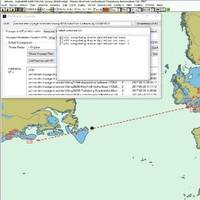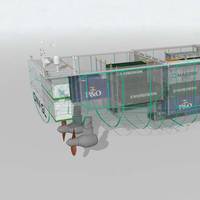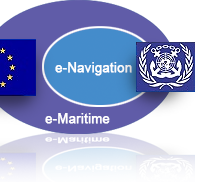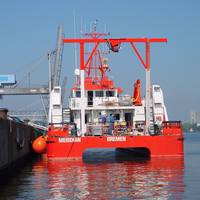STM Validation: Interoperable Ship and Shore Center Services

Inspired by the European program for Air Traffic Managemen, the Sea Traffic Management (STM) methodology has been developed by the Swedish Maritime Administration MonaLisa project to define a set of systems and procedures to guide and monitor maritime traffic. The STM Validation project co-financed by the European Union has made the first operational tests with the shore center manufacturers. The key to the interoperability between different systems is the robust underlying infrastructure.
Available: 300 Free Systems; Wanted: 300 Ships
Which will be the first 300 ships in the world to test and validate Sea Traffic Management (STM) with updated systems free-of-charge? As the shipping domain is takes steps in information technology, the STM Validation Project aims to demonstrate the STM concept in large-scale test beds in both the Nordic and Mediterranean Seas, encompassing around 300 vessels, 10 ports and five shore based service centres as well as using the European Maritime Simulator Network. The predecessor project, MONALISA 2.0, defined a need for validating STM in ports and on board ships supported by service centers on shore. 300 “STM-Systems” will be installed on board ships, developed and installed by ECDIS-manufacturers free-of-charge, and start running live in 2017.
Unmanned Vessels: The Future is Now

There is a global boom in the development of unmanned systems, from below the ocean’s surface to high in the sky to the world’s roads. Add to this list the maritime industry, on both military and civilian vessels. Maritime Reporter & Engineering News examines in depth recent developments taking place in Europe to discover general thoughts and technical trends driving the future of unmanned shipping. The joint European Research Project MUNIN was finalized in August 2015, a project…
International Cooperation will Streamline Maritime Transport
Sweden, South Korea and Denmark have initiated a global partnership on the development of e-navigation solutions. Modern technology will lead to higher safety and more efficient transports at sea. The Swedish Maritime Administration is leading the largest European e-navigation project, MONALISA 2.0. The main objective of MONALISA 2.0 is Sea Traffic Management (STM) and to find solutions that will improve dynamic route planning and collaboration, while promoting a common exchange of voyage plan information. Sweden, Denmark and South Korea have now signed a Memorandum of Understanding (MoU) to implement common test beds for future e-navigation solutions. A global test bed is essential to be able to demonstrate the concept of Sea Traffic Management in full scale.
Swedish Icebreaker Tests Traffic Monitoring System
Maritime traffic in the Arctic is rising dramatically, leading to a greater need for safety and environmental protection. Consequently, as part of the icebreaker Oden’s Artic expedition, the Swedish Maritime Administration is testing a new tracking system for maritime traffic. The World Wildlife Fund, WWF, is also positive to the project. The Arctic is one of the world’s most environmentally sensitive areas, while also being one of the most difficult to protect against accidents. Thus, the need to support the maritime industry is crucial in guaranteeing safety for navigation and the environment. The Swedish Maritime Administration is now testing a new system for monitoring maritime traffic that will improve the potential for sea rescue, icebreaker assistance and environmental protection.
Monalisa 2.0 Aims to Enhance Safety, Environment

The starting shot is about to go for the Swedish Maritime Administration’s EU-project, Monalisa 2.0. Innovations and Sea Traffic Management will lead to greater efficiency, higher safety and reduced environmental impact. Vessel traffic is increasingly intensive, leading to a growing risk of accidents. With a superior decision-making base for shipping and a new concept for Sea Traffic Management, the Swedish Maritime Administration – in cooperation with some 30 partners throughout Europe – aims to raise maritime safety.
Transas SimUC 2013 to Address e-Navigation Challenges

E-Navigation has been a hot topic in the maritime industry for some time, and it is likely that it will continue to be into the future. But for many in the industry, the subject remains an abstraction that everybody is talking about but few can properly explain. That is why the Future Challenges in e-Navigation session is one of the highlights of the Transas Simulation User Conference 2013 with its theme, Future Trends and New Challenges in Maritime Simulation. The session will…
Monalisa 2.0 - Moving Maritime into the Digital Age
The Swedish Maritime Administration has initiated an extension of the ongoing Monalisa project, called Monalisa 2.0, through a renewed application to the European Commission's TEN-T program. Monalisa 2.0 takes its point of departure in the results and experiences from the current Monalisa project, co-financed by TEN-T under the Motorways of the Sea and which has received very positive feedback from stakeholders, international bodies and the European Commission. Monalisa 2.0 is a concrete step in the process of further developing the Motorways of the Sea concept by implementing concrete pilot actions and studies that will foster deployment of new maritime services and processes.
Hydrographic Survey Contract for Fugro OSAE

The hydrograpiic survey work for the years 2012-13, consists of a 7,100km² segment worth EUR 2.1 million. Data acquisition will be accomplished by Fugro vessels, two of which, M.V. Meridian and M.V. Victor Hensen, have already done survey work on the previous year's allocation of Baltic and Bothnian surveys. With water depths up to 300m, the survey will be undertaken following the Swedish and Finnish adaptation of the IHO Standards for Hydrographic Survey, S-44, namely FSIS-44.
'Motorways of the Sea' Contract MMT for Hydrographic Survey
MMT (Sweden) has been awarded parts of two separate hydrographic survey contracts for the EU financed project 'MONALISA' for the Swedish Maritime Administration (SMA) and the Finnish Transport Agency (FTA). MONALISA is a Motorways of the Sea project which aims at giving a concrete contribution to efficient, safe and environmentally friendly maritime transport. This is done through development, demonstration and dissemination of innovative e-navigational services to the shipping industry, which can lay the groundwork for a future international deployment. Quality assurance of hydrographic data for the major navigational areas in Swedish and Finnish waters in the Baltic Sea contributes to improving safety and the optimization of ship routes.
TEN-T Contributes to MonaLisa Project
The “MonaLisa” project, an action in the Baltic Sea region aimed at improving the quality of maritime transport, will benefit from €11.23 million (nearly $16 million) in EU contribution from the 2010 TEN-T Multi-Annual Call. The project, which forms part of TEN-T Priority Project 21 “Motorways of the Sea,” will run until 2013 and includes the participation of three Member States (Denmark, Finland and Sweden). The “MonaLisa” project aims at improving quality of maritime transport, safety at sea, exchange of maritime data and facilitation of environmental performance of shipping and implementation of e-Maritime relevant applications. Although three Member States are currently participating in the project, more will be able to join once the project is underway.









